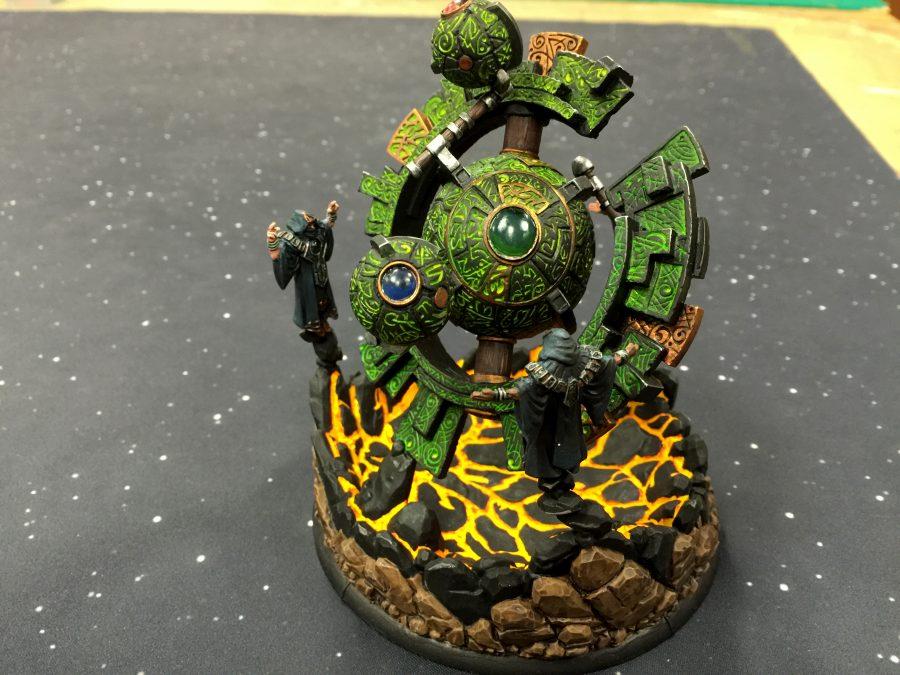These characters can range in race and class, from a simple human monk to a hulking Orc barbarian. Players see their character grow in each encounter, gaining experience points that can later be cashed in to focus on increasing stats or learning new traits, such as new spells or advanced bartering skills.
“Dungeons & Dragons” started in 1974, conceived by Gary Gygax and Dave Arneson, as a blending of miniature figure-based board games and individual role-playing. It’s a game where anything can happen, where what the overseer for the game, known as the Dungeon Master, says goes. Players simply weigh their options, talk it out and roll the dice to see their actions unfold and the consequences that lie ahead.
Will Morse, a sophomore majoring in nursing, has been a recurring customer at Crimson Castle for three months, playing both “Dungeons & Dragons” and its counterpart, “Pathfinder.” His character is known as Bright Star, a Kitsune (fox-like) cleric, using magic to both heal the party and damage foes.
Each campaign has its own level of variability in the story, with the Dungeon Master dictating the events of the story. The campaigns can go either good or bad, with random enemy encounters occurring at a moment’s notice. In one of Morse’s games, however, the problem at hand came from the actions of another player.
“We had one person who got drunk in the campaign and so we locked him in a room so he wouldn’t do anything. He woke up and tried to get out, so he tried to get through the door and of course – it’s locked, so he tried jumping out the window,” Morse said. The story doesn’t end well from there, with the drunken player falling from the window and crushing the door on top of the innkeeper who had tried to investigate the noise. This level of variability creates a compelling story for all involved, and over the course of the play-session, players can often lose themselves in the game, transitioning from the basic board-game style to a more conversational feel to the gameplay.
“It’s not always on a board; sometimes we’re just sitting back and talking,” Morse said. “On the board is mostly fights or depicting ‘Okay, you’re here, here’s the walls, where exactly do you go?’ But if we’re just walking around town trying to buy stuff, it’s not really on the board – it doesn’t have to be.”
The board contains miniature figures, chosen by each player, which are often meticulously painted and designed by players themselves. These miniatures can be used across games, and each game offers its own level of skill.
Crimson Castle co-owner, Terry Victory, explained that miniatures themselves are complex.
“We figured out one time that there are four hobbies in one miniatures game,” Victory said. “First off is the actual model, putting it together or changing it in some way or fashion. Secondly is painting it, third is just collecting it, and some of those models actually look pretty damn cool. Fourth is just playing the game.”
Even after crafting the miniature figure, players must keep the figure in good shape, carrying tool kits to keep the figure intact and large carrying cases to transport the figures. Though miniatures may be used across games, there are some miniatures that are intended for use in their own game.
In the case of the game “Warhammer,” players use miniatures to wage war. Though the war is just for fun, it incorporates some real-world tactics such as fields of movement, line of sight and ballistic damage when factoring in angles. These can lead to some intense fights, with meticulous work put into finding the right move to take the enemy down.
While Crimson Castle offers a place for players to meet up and play, the business has collected a large array of games, from card games like “Magic the Gathering” to complex board games such as “Star Trek Attack Wing.” Monday and Saturday nights are designated as board game nights, offering a simpler approach for those who may not want to delve into a full-fledged role playing game.
“What I tell anybody as far as new games go is come in and you play it,” Victory said. “You be the champion of this game, get other people to play it. I will special order something all day long … When you get a little bit of a following for it, I’ll start carrying it on the shelves.”









